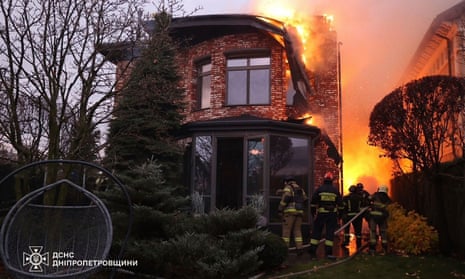Opening summary
Russia fired an “experimental” ballistic missile at the central Ukrainian city of Dnipro on Thursday in what the Ukrainian president, Volodymyr Zelenskyy, called “a clear and severe escalation” of the 33-month-old war.
Vladimir Putin said the strike was “a response to US plans to produce and deploy intermediate and short-range missiles”. The Russian president also threatened further attacks, saying Moscow “had the right” to strike western countries that provided Kyiv with weapons used against Russian targets.
A Nato spokesperson said Russia was seeking to “terrorise” civilians and intimidate Ukraine’s allies. “Deploying this capability will neither change the course of the conflict nor deter Nato allies from supporting Ukraine,” Farah Dakhlallah said.
The attack came after the US and the UK lifted a ban on Kyiv striking Russian territory with advanced western weapons. Russia notified Washington shortly before Thursday’s strike, a US official said.
Putin said in a televised address to the nation that Moscow hit a Ukrainian military facility with a new medium-range ballistic missile known as “Oreshnik” (the hazel). And the Russian leader hinted the missile was capable of unleashing a nuclear payload and said Russia would “respond decisively and symmetrically” in the event of an escalation.

In other developments:
-
The new ballistic missile was part of a wider salvo of nine missiles fired from the Astrakhan region of Russia in the early hours of Thursday. Six of the missiles were intercepted by Ukraine’s air force but the new ballistic missile was not stopped. The missile was said to have hit “without consequences”, Ukraine’s air force said, though it added that complete information about victims had yet to be received.
-
Volodymyr Zelenskyy called for strong worldwide condemnation on the strike, describing it as a major step-up in the “scale and brutality” of the war. The Ukrainian president said the attack was “yet more proof that Russia has no interest in peace”, adding that a “response is needed. Pressure is needed. Russia must be forced into real peace, which can only be achieved through strength”.
-
US and UK sources indicated they believed the missile was an experimental, nuclear-capable, intermediate-range ballistic missile (IRBM), which has a theoretical range of below 3,420 miles (5,500km). That is enough to reach Europe from where it was fired in south-western Russia, but not the US.
-
UN secretary general António Guterres’s spokesperson said Russia’s use of the new ballistic missile was “yet another concerning and worrying development. “All of this [is] going in the wrong direction,” Stéphane Dujarric said as he called on all parties to de-escalate the conflict and “to protect civilians, not hit civilian targets or critical civilian infrastructure”.
-
Russian strikes killed at least two people in the north-eastern Ukrainian city of Sumy, the acting mayor said on Friday. “Several massive explosions occurred in Sumy,” Artem Kobzar said on Telegram. He said air defences were still working as of just before 6am local time and warned residents to stay away from windows. The Sumy regional military administration said a residential neighbourhood had been struck by a Russian drone, adding that rescue operations were under way. It confirmed the two deaths and said 12 people had been injured.
-
Russia’s defence ministry said on Thursday that its forces had captured the eastern Ukrainian village of Dalne in the Donetsk region, a focal point of their advance. Ukraine’s general staff made no acknowledgment of Dalne being in Russian hands. The Ukrainian military’s late report mentioned the village as one of seven in an area where Russian forces had tried to pierce Ukrainian defences 26 times over the previous 24 hours. It said 10 of 16 armed clashes in the area continued.
-
Ukraine’s parliament postponed a sitting due to have taken place on Friday out of security concerns, public broadcaster Suspilne reported, quoting sources. It said the order told members to keep their families out of Kyiv’s government district and quoted parliamentarians as saying that, for the moment, the next sitting was not scheduled until December.
Key events
Russian ballistic missile attack a ‘severe escalation’, says Zelenskyy

Pjotr Sauer
Volodymyr Zelenskyy said the use of an experimental ballistic missile by Russia amounted to “a clear and severe escalation” in the war and called for strong worldwide condemnation, as Nato accused Vladimir Putin of seeking to “terrorise” civilians and intimidate Ukraine’s allies.
Nato spokesperson Farah Dakhlallah said:
Deploying this capability will neither change the course of the conflict nor deter Nato allies from supporting Ukraine.”
In a statement after Vladimir Putin’s address about Thursday’s strike on a military site in the city of Dnipro, Zelenskyy said the attack was “yet more proof that Russia has no interest in peace”, adding that “pressure is needed. Russia must be forced into real peace, which can only be achieved through strength”.
The Russian president threatened further attacks, saying Moscow “had the right” to strike western countries that provided Kyiv with weapons used against Russian targets.
“A regional conflict in Ukraine previously provoked by the west has acquired elements of a global character,” Putin said in an address to the nation carried by state television after 8pm in Moscow.
Ukraine’s parliament reportedly postponed a Friday sitting because of “potential security issues” after the attack, public broadcaster Suspilne said, quoting sources. It reported that legislators were told to keep their families out of Kyiv’s government district and quoted parliamentarians as saying that, for the moment, the next sitting was not scheduled until December.
The new ballistic missile was called Oreshnik (the hazel), Putin said, and its deployment “was a response to US plans to produce and deploy intermediate and short-range missiles”. He said Russia would “respond decisively and symmetrically” in the event of an escalation.
Russian defence minister, Andrei Belousov, said in a video released on Friday that Russian forces in Ukraine had accelerated their advance, reports Reuters.
According to the news agency, Belousov was shown in the defence ministry footage visiting a Russian command post in Ukraine and handing out medals for bravery.
Russia provided economic support and anti-air missiles to North Korea in exchange for troops to support Moscow’s war on Ukraine, Seoul’s top security chief told a TV news channel on Friday, reports Agence France-Presse (AFP).
“It has been identified that equipment and anti-aircraft missiles aimed at reinforcing Pyongyang’s vulnerable air defence system have been delivered to North Korea,” Shin Won-sik, Seoul’s top security adviser, told TV broadcaster SBS.
Opening summary
Russia fired an “experimental” ballistic missile at the central Ukrainian city of Dnipro on Thursday in what the Ukrainian president, Volodymyr Zelenskyy, called “a clear and severe escalation” of the 33-month-old war.
Vladimir Putin said the strike was “a response to US plans to produce and deploy intermediate and short-range missiles”. The Russian president also threatened further attacks, saying Moscow “had the right” to strike western countries that provided Kyiv with weapons used against Russian targets.
A Nato spokesperson said Russia was seeking to “terrorise” civilians and intimidate Ukraine’s allies. “Deploying this capability will neither change the course of the conflict nor deter Nato allies from supporting Ukraine,” Farah Dakhlallah said.
The attack came after the US and the UK lifted a ban on Kyiv striking Russian territory with advanced western weapons. Russia notified Washington shortly before Thursday’s strike, a US official said.
Putin said in a televised address to the nation that Moscow hit a Ukrainian military facility with a new medium-range ballistic missile known as “Oreshnik” (the hazel). And the Russian leader hinted the missile was capable of unleashing a nuclear payload and said Russia would “respond decisively and symmetrically” in the event of an escalation.
In other developments:
-
The new ballistic missile was part of a wider salvo of nine missiles fired from the Astrakhan region of Russia in the early hours of Thursday. Six of the missiles were intercepted by Ukraine’s air force but the new ballistic missile was not stopped. The missile was said to have hit “without consequences”, Ukraine’s air force said, though it added that complete information about victims had yet to be received.
-
Volodymyr Zelenskyy called for strong worldwide condemnation on the strike, describing it as a major step-up in the “scale and brutality” of the war. The Ukrainian president said the attack was “yet more proof that Russia has no interest in peace”, adding that a “response is needed. Pressure is needed. Russia must be forced into real peace, which can only be achieved through strength”.
-
US and UK sources indicated they believed the missile was an experimental, nuclear-capable, intermediate-range ballistic missile (IRBM), which has a theoretical range of below 3,420 miles (5,500km). That is enough to reach Europe from where it was fired in south-western Russia, but not the US.
-
UN secretary general António Guterres’s spokesperson said Russia’s use of the new ballistic missile was “yet another concerning and worrying development. “All of this [is] going in the wrong direction,” Stéphane Dujarric said as he called on all parties to de-escalate the conflict and “to protect civilians, not hit civilian targets or critical civilian infrastructure”.
-
Russian strikes killed at least two people in the north-eastern Ukrainian city of Sumy, the acting mayor said on Friday. “Several massive explosions occurred in Sumy,” Artem Kobzar said on Telegram. He said air defences were still working as of just before 6am local time and warned residents to stay away from windows. The Sumy regional military administration said a residential neighbourhood had been struck by a Russian drone, adding that rescue operations were under way. It confirmed the two deaths and said 12 people had been injured.
-
Russia’s defence ministry said on Thursday that its forces had captured the eastern Ukrainian village of Dalne in the Donetsk region, a focal point of their advance. Ukraine’s general staff made no acknowledgment of Dalne being in Russian hands. The Ukrainian military’s late report mentioned the village as one of seven in an area where Russian forces had tried to pierce Ukrainian defences 26 times over the previous 24 hours. It said 10 of 16 armed clashes in the area continued.
-
Ukraine’s parliament postponed a sitting due to have taken place on Friday out of security concerns, public broadcaster Suspilne reported, quoting sources. It said the order told members to keep their families out of Kyiv’s government district and quoted parliamentarians as saying that, for the moment, the next sitting was not scheduled until December.







